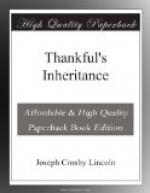Miss Parker turned upon him. “To think,” she wailed, brokenly, “to think that my own brother—all the brother I’ve got—can stand afore me and heave my—my poverty in my face. I may be dependent on him. I am, I suppose. But Oh, the disgrace of it! the—Oh! Oh! Oh!”
Captain Obed hurried upstairs to his room. Long after he had shut the door he heard the sounds of Hannah’s sobs and Kenelm’s pleadings that he “never meant nothin’.” Then came silence and, at last, the sounds of footsteps on the stairs. They halted in the upper hall.
“I don’t know, Kenelm,” said Hannah, sadly. “I’ll try to forgive you. I presume likely I must. But when I think of how I’ve been a mother to you—”
“Now, Hannah, there you go again. How could you be my mother when you ain’t but four year older’n I be? You just give me a few dollars and let me go to that Cattle Show and—”
“No, Kenelm, that I can’t do. You are goin’ to leave Mrs. Barnes’ place; I want you to do that, for the sake of your self-respect. But you must stay there and help her tomorrow. It’s your duty.”
“Darn my duty! I’ll leave tomorrow, that’s what I’ll do.”
“Oh dear! There you go again. Profane language and bettin’ on horses! What’ll come next? My own brother a gambler and a prodigate! Has it come to this?”
The footsteps and voices died away. Captain Obed blew out the light and got into bed. The last words he heard that night were uttered by the “prodigate” himself on his way to his sleeping quarters. And they were spoken as a soliloquy.
“By time!” muttered Kenelm, as he shuffled slowly past the Captain’s door. “By time! I—I’ll do somethin’ desperate!”
Next morning, when Captain Obed’s hired motor car, with its owner, a Wellmouth Centre man, acting as chauffeur, rolled into the yard of the High Cliff House, a party of three came out to meet it. John Kendrick and Emily Howes were of the party and they were wrapped and ready for the trip. The captain had expected them; but the third, also dressed for the journey, was Mrs. Thankful Barnes. Thankful’s plump countenance was radiant.
“I’m goin’ after all,” she announced. “I’m goin’ to the Fair with you, Cap’n Bangs. Now what do you think of that? . . . That is,” she added, looking at the automobile, “if you can find a place to put me.”
The captain’s joy was as great as his surprise. “Place to put you!” he repeated. “If I couldn’t do anything else I’d hang on behind, like a youngster to a truck wagon, afore you stayed at home. Good for you, Mrs. Thankful! But how’d you come to change your mind? Thought you couldn’t leave.”
Thankful smiled happily. “I didn’t change my mind, Cap’n,” she said. “Imogene changed hers. She’s a real, good sacrificin’ body, the girl is. When she found I’d been asked and wouldn’t go, she put her foot down flat. Nothin’ would do but she should stay at home today and I should go. I knew what a disappointment ’twas to her, but she just made me do it. She’ll go tomorrow instead; that’s the way we fixed it finally. I’m awful glad for myself, but I do feel mean about Imogene, just the same.”




